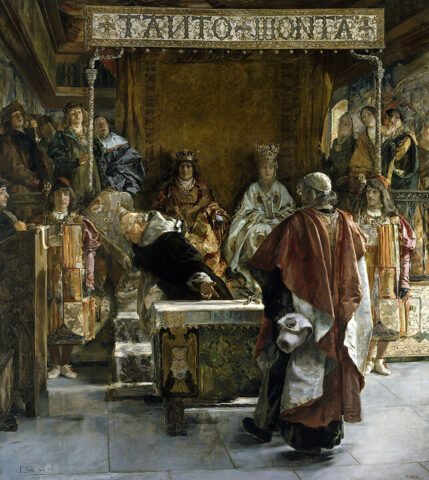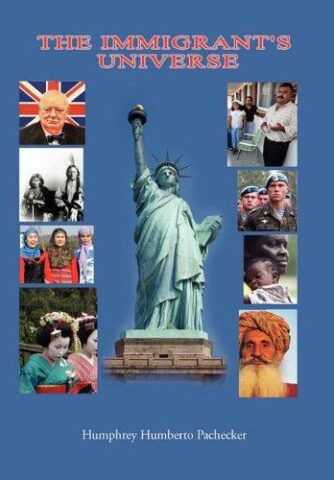My Jewish descent comes from Portugal to Spain and then to the Americas…

My Jewish descent comes from Portugal to Spain and then to the Americas.
It is well documented that Jews have been subjected to historical discrimination and persecution for various interconnected reasons, spanning religious, social, economic, and political spheres.
-
Religious Prejudice:
Christian Teachings of Contempt: The belief that Jews are collectively responsible for the death of Jesus (deicide) and the rejection of Jesus as the Messiah, as well as interpretations of scriptures portraying Jews negatively, contributed significantly to historical and ongoing antisemitism, according to the American Jewish Committee.
Religious and Cultural Distinctiveness: The Jews’ adherence to their unique religious practices, dietary laws, and social customs, coupled with their refusal to assimilate fully into the surrounding cultures and convert to Christianity, fueled perceptions of them as “different” and “other,” leading to social and religious discrimination.
-
Scapegoating:
Blaming Jews for Societal Ills: Throughout history, Jews have often been falsely blamed for societal problems, including economic crises, plagues, and political unrest, making them convenient scapegoats for popular frustrations and grievances, as noted by the American Jewish Committee.
-
Economic Resentment:
Restricted Occupations and Moneylending: Forced into limited professions like moneylending by societal restrictions and prohibitions, some Jews, despite facing widespread poverty, achieved economic success, arousing resentment and envy among certain segments of the population and leading to the propagation of negative stereotypes about Jewish avarice and control of wealth, according to the Holocaust Encyclopedia.
-
Nationalism and Xenophobia:
Perceived as “Foreigners” and “Outsiders”: With the rise of nationalism, Jews were often seen as disloyal foreigners who could not fully belong to the nation, leading to their marginalization and discrimination, particularly in the 19th and 20th centuries.
-
Conspiracy Theories:
Accusations of World Domination and Control: The infamous fabricated text, The Protocols of the Elders of Zion, purported to reveal a secret Jewish plan for world domination and control, which, despite being widely debunked, fueled antisemitic conspiracy theories and propaganda, according to the American Jewish Committee.
-
Nazi Ideology and Racial Antisemitism:
The Holocaust: Nazi ideology, fueled by racial antisemitism and a belief in the superiority of the Aryan race, culminated in the Holocaust, the systematic genocide of six million European Jews.
In essence, historical discrimination against Jews stemmed from a complex interplay of religious prejudice, scapegoating, economic resentment, and the rise of exclusionary ideologies like nationalism and racial antisemitism.
My Jewish descent comes from Portugal, to Spain and then to the Americas. My Jewish ancestors last names are Aparicio, Alejo, Pacheco on my father’s and grandmother side, on my side we are Pacheco-Pachecker, derivates from Pacieco year 1490.
Jewish Surnames In the Galut Or The Gola (Exile), In The Tefutsot Or The Tefotsot|Hatfutsot, Hatefutsot, Hatefutsoth| (Diasporas, Diaspora [Dispersion]).
APARICIO- ALEJO-PACHECO old surnames originating from Portugal and Spain- Vizcaya that passed to Asturias and later to Castilla.
Aparicio appears as the surname of the Jews expelled in 1492 and deported by France during World War II. Geographic space: Spain, Argentina, USA and Western Europe.
The list of the most common Jewish surnames in Spain and Portugal total exceeds thousands but here I show you the most common: A: Abraham, Acevedo, Acosta, Aguado, Aguiar, Aguilar, Alarcón, Alba, Aldana, Alcalá, Alegre, Alfonso, Alfaro , Almeida, Alonso, Álvarez, Amigo, Amado, Amaya, Aranda, Aparicio and Alejo, followed by Pacheco from Portugal then goes to Spain.
The basis of my personal story begins here, when my godmother and third cousin, Gloria Pacheco de Torres, gave me a printed article published in the 1950s of the genealogical tree relationship of the Pacheco’s and its different branches and activities rendered according to family and country.
My family’s last name on my father’s side is Pacheco. It has its origin in Portugal and was very old and notable in the Lusitanian country then. When they immigrated to Spain, its nobility increased even more for the services the Pacheco’s provided to this country, for which the family was well compensated with wealth and privileges.
My godmother, Gloria Pacheco de Torres, is the daughter of Ana Maria Hernandez Rodriguez and Julio Pacheco Rodriguez, who was a brother of my grandfather Juan Pacheco Rodriguez Rey.
Ninety-two years before Jesus Christ, the Pacheco’s had their origin. There are testimonies from some traders who wrote that at the beginning of this year, there was a Roman general 15 named Vivio Pacieco, who had a descendant had named Lucio Viminio Pacieco, who served under Julio Caesar. According to family tradition, this name came from a general called Vivio Pacieco, who descended from Lucio Viminio Pacieco, who was under the command of Julius Cesar, in Andalucía. Julius Caesar was a Roman general and politician who named himself dictator of the Roman Empire, a rule that lasted less than one year before he was famously assassinated by political rivals in 44 B.C.
The descendant Luis Pacheco was a Sephardic (Spanish) Jew and one of the first to arrive in Cuba with Christopher Columbus in 1492. A Sephardic Jew is a Jew who follows the customs and traditions followed by Jews who lived in the Spain and Portugal before their expulsion in the late fifteenth century.
This includes both the descendants of Jews expelled from Spain under the Alhambra Decree of 1492, or from Portugal by order of King Manuel I in 1497; and the descendants of Crypto-Jews who left the peninsula in later centuries for North Africa, Asia Minor, the Philippines, and elsewhere around the world, as well as the descendants of Crypto-Jews who remained in Iberia.
There were at least seven Jews who sailed with Columbus in his first voyage, including Rodrigo de Triana, who was the first to sight land (Columbus later assumed credit for this); Maestre Bernal, who served as the expedition’s physician; and Luis de Torres, the interpreter, who spoke Hebrew and Arabic, which it was believed would be useful in the Orient, Columbus’s intended destination. Four of the Pacheco’s branches from Spain moved to America, Cuba, Ecuador, Venezuela, and Mexico; and later other two to Hawaii and Puerto Rico, where they established, and their descendant continue today in these countries.
Luis Pacheco was a Sephardic Jew and one of the first to arrive in Cuba with Christopher Columbus in 1492. A Sephardic Jew is a Jew who follows the customs and traditions followed by Jews who lived in the Spain and Portugal before their expulsion in the late fifteenth century. This includes both the descendants of Jews expelled from Spain under the Alhambra Decree of 1492, or from Portugal by order of King Manuel I in 1497; and the descendants of Crypto-Jews who left the peninsula in later centuries for North Africa, Asia Minor, the Philippines, and elsewhere around the world, as well as the descendants of Crypto-Jews who remained in Iberia.
There were at least seven Jews who sailed with Columbus in his first voyage, including Rodrigo de Triana, who was the first to sight land (Columbus later assumed credit for this); Maestre Bernal, who served as the expedition’s physician; and Luis de Torres, the interpreter, who spoke Hebrew and Arabic, which it was believed would be useful in the Orient, Columbus’s intended destination.
Four of the Pacheco’s branches from Spain moved to America, Cuba, Ecuador, Venezuela, and Mexico; and later other two to Hawaii and Puerto Rico, where they established, and their descendant continue today in these countries.
When Cuba’s war of independence from Spain began in 1868, a lot of Cubans left for the north, and they spent their exile mostly in the state of Florida, creating and establishing a community in Tampa and in Key West.
Around this year was when a man named Don Juan Pacheco Rodriguez Rey moved to Tampa. First, he worked as a meat butcher, although majority of the Cubans there were workers in the tobacco industry. Tobacco plants and leaves were exported to these new Cubans in Florida, and some of these Cubans were able to establish big businesses of tobacco. Some of this manufacturing centers of Cuban American were in Ybor City, where Don Juan Pacheco Rodriguez resided, later becoming a bilingual notary’s apprentice and translator.
Don Juan Pacheco Rodriguez, my grandfather, and Doña Carmen Roque Aparicio, my grandmother, had five brothers and one sister. Their names were Arlon, Julio, Pastor, Blanco, Agustino, and America Pacheco.
The grandfather and grandmother of Don Juan Pacheco Rodriguez, or my great-grandparents, were named Don Elia Pacheco and Dona Crucita Alejo.
In 1902, Cuba finally obtained its independence from Spain and from the United States. After the Spanish-American War, Spain and the United States signed the Treaty of Paris in 1898, by which Spain ceded Puerto Rico, the Philippines, and Guam to the United States for the sum of $20 million.
Under the same treaty, Spain relinquished all claim of sovereignty over the title to Cuba.
President Theodore Roosevelt, who had fought in the Spanish-American War and had some sympathies with the independence movement, succeeded McKinley as U.S. President in 1901 and abandoned the twenty-year treaty.
Instead, Cuba gained formal independence from the U.S. on May 20, 1902, as the Republic of Cuba.
It was also in this year when Don Juan Pacheco Rodriguez went back to Cuba and married Doña Carmen Leon Roque, the daughter of Luisa Josefa Rodriguez Roque Aparicio and Jose Pacheco Alejo, in the city of Las Villas, where Jose Pacheco Alejo was member of a rich family of landholders.
From this marriage, several children were born. There was one named Humberto Pacheco Leon, my father, who later moved to the capital of Cuba, Havana. This man was an educated military officer for three decades and a businessman.
In Havana, in 1950, this man married a young lady named Zenaida Cardenas Cardenas, my mother. From this marriage, there were two children born: first, a male named Humberto Pacheco Cardenas, who adopted the last name of Pachecker; and another child, named Doris Dolores Pacheco Cardenas.
Painting. The Grand Inquisitor friar Tomás de Torquemada in 1492 offers to the Catholic Monarchs the Edict of expulsion of the Jews from Spain for their signature. Oil by Emilio Sala y Francés. Written by Humphrey Humberto Pachecker.

